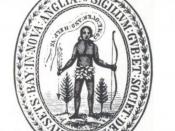During the seventeenth and eighteenth century, both Puritanism and the Great Awakening played crucial roles in developing American society by paving the way to the development of democracy, by establishing a culture governed by ethics and morals, and by creating a united and independent society. The Puritans referred to motley "group of religious reformers who emerged within the Church of England" and "shared a common Calvinist theology" (Heyrman, 2002). Their opposition to the Anglican Church and its impurities, eventually led to their dispersal into the American colonies, where they established their own sense of "genuine self-government" (Bailey and Kennedy, 43).
After some initial "surveys" of land, the Puritan Pilgrims settled in Plymouth Rock, where they signed the Mayflower Compact in 1620. This seemingly insignificant document actually served as the "invaluable precedent for later constitutions" (Bailey and Kennedy, 43). This document, the first American constitution, enabled adult male settlers to assemble and "create their own laws in open-discussion town meetings," which was considered a great privilege (44).
The Puritan Pilgrims also had the opportunity to elect their leaders, one of whom was the noted scholar William Bradford (44). This early form of Puritan government parallels the democracy that exists in America today.
"Among the ideals embraced within the social heritage of Americans, a peculiar importance attaches to Puritanism and democracy." The correlation between Puritanism and democracy can be seen with the emphasis that both place on "ideals." The Puritan faith has justified many events, and in that respect, it "has repeatedly served as the basis of concerted action" (Perry, 34). Puritanism rationalized the "reforming and separatist movements in the Anglican church", the English Revolution, English migrations to New England in the early seventeenth century, and the transformation of the Puritan settlements into a unified and theocratic state (34).
In 1629, certain...


